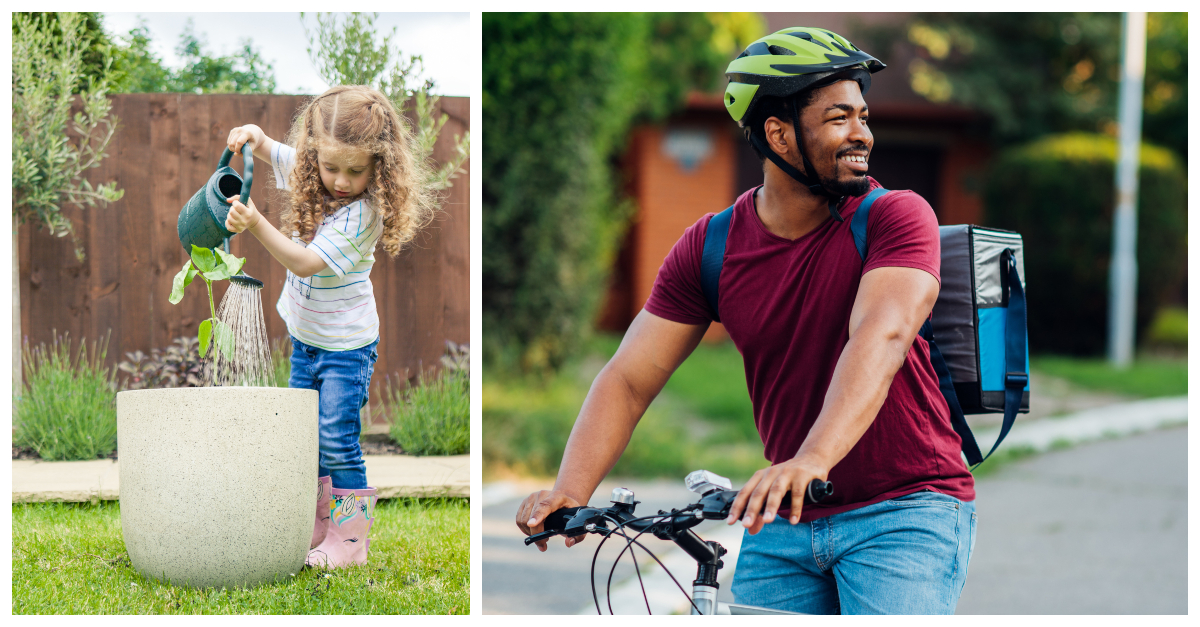
The climate change crisis is undeniable. We're seeing the impacts more and more with each passing year. Most people are on board with the idea that we have to take action now. However, that action doesn't just come from our legislators and leaders. In fact, some of the most important things we can do happen right from our own homes. That's because if everyone chipped in and did their part to help slow climate change, we could drastically reduce our own ecological footprint and create a better world for our kids.
Many things might feel uncomfortable or strange at first. But a big part of helping to slow climate change involves creating new habits. Once we begin those new habits and stick to them, they'll become ingrained, and before we know it, we'll forget we ever did things the old, less environmentally friendly way.
Here are seven things you can do from your own home to help ease your impact on climate change:
Walk or Bike to Work
One huge thing we can do to help decrease our own footprint is to walk or bike to work. If we already work from home, we're already having a positive impact on the environment. Driving frequently reduces air quality through hazardous air pollution. Vehicle exhaust accounts for about 55% of nitrogen oxides and 60% of carbon monoxide emissions, which is a pretty big number with an even bigger impact.
Start Composting
Composting is a wonderful thing to get in the habit of for so many reasons. For starters, it's easy, and we can do it from the comfort of our kitchens. It drastically decreases how much waste comes from our home. Think about all of the scraps of food you throw away on the regular! Composting puts those scraps to good use by saving them for your garden, helping new food grow. It's the ultimate way to recycle!
Rely on Natural Light
If you have a few windows in your home, you can rely on natural light for most of your day, unless it's cloudy. Of course, you're going to need to turn on lights when it's dark out, and chances are, there are spaces in your home that don't get much outside light, either. But using natural light whenever you can is a great way to save energy. Likewise, turning off lights whenever you leave a room is a great habit to begin.
Install Low-Flow Toilets and Showerheads
Installing a low-flow showerhead, as well as a low-flow toilet, can save tons of CO2 — about 350 pounds a year. Taking shorter showers helps, too, of course. But once you have these items in place, you'll be set up to use a lot less water. Turning your water heater down (120 degrees Fahrenheit is ideal) has the same impact, saving about 550 pounds of CO2 a year.
Bring Reusable Shopping Bags to the Store
One hugely important thing we can do is stop using plastic wherever we can. That can be tough sometimes (most of our kitchens have tons of plastic in them), but one super-easy thing to do is to stop relying on plastic bags from the grocery store. All we need to do to make this happen is to pick up a few cute reusable bags to bring on grocery store trips. Once you get in the habit of slinging them over your shoulder before you walk out the door, it becomes an easy habit to stick to. Likewise, we should avoid plastic water bottles and rely on reusable ones.
Plant a Garden
We all know plants release oxygen. They also take in carbon dioxide. Flowers attract bees and other insects that rely on them to survive, too. So whether you're planting flowers, other plants, or trees, you're helping the environment. Creating green spaces for plants, grasses, and trees also helps lead to better cooling, which is now necessary with the worsening impacts of climate change.
When you grow your own fruits and vegetables, you're also self-sustaining. Plus, you can grow your food organically (using your compost!) without chemicals that harm the environment.
Pay Your Bills Online
These days, you can drastically decrease how much paper comes into your home by paying all of your bills online. Plus, it's easier, and you can set up reminders, too. Also, keep your work on the screen and avoid printing whenever you're able to. Not only does having less paper help the environment, it also keeps your home clutter-free.




